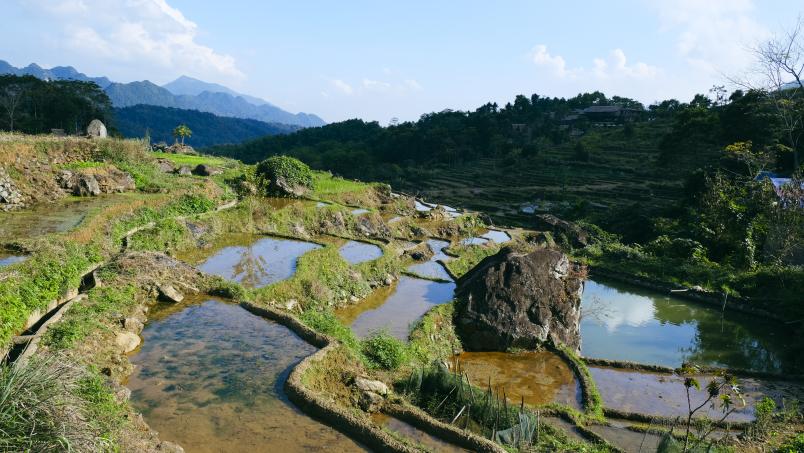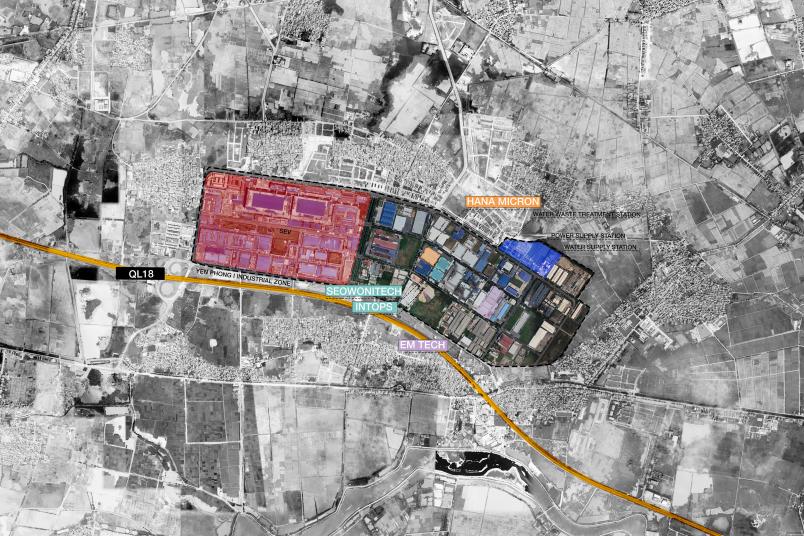
Social Sciences
From the Chip Factory to the Nail Salon
The boom in Vietnam’s chip industry has opened up careers that seem unusual at first glance. A closer look at the developments reveals a whole host of contradictions.
Temples, beaches, rice paddies – these are the things that many people are likely to associate with Vietnam. But the rice paddies are dwindling. They have to make way for something new. This is because Vietnam has a plan: The Asian country is striving to become a major player in the chip industry. The coronavirus pandemic and political tensions between China and the USA have shaken up the industry. “The coronavirus measures have caused some hiccups in the production chains, which have shown the West how dependent it currently is on China,” says Dr. Stefan Laser, social scientist at Ruhr University Bochum. “Consequently, there’s political interest for the chip industry to gain a foothold in other countries, too.”

Vietnam wants to become the new Taiwan in the long term.
As part of the Collaborative Research Center “Virtual Lifeworlds”, Laser and his colleagues are exploring the dynamics in the value chains of the IT and chip industry. Taiwan is currently at the heart of these processes. “90 percent of high-speed chips are manufactured there,” says Stefan Laser. “Even in the lower segment of the value chain, Taiwan still produces 50 percent of the products.” However, if the Vietnamese government has its way, this is about to change. “Vietnam wants to become the new Taiwan in the long term,” points out Laser. Because the country is considered politically stable and is strategically located by the sea, the West also has a vested interest in seeing Vietnam become a stronger player in the chip industry.
Virtual information infrastructures
Field research in Vietnam
However, the path towards this goal is not as clear-cut as some politicians make it out to be. There’s a lot of controversy surrounding the chip boom in Vietnam, as Stefan Laser’s work reveals. It certainly helps that he’s able to conduct extensive research on site in the Southeast Asian country. This means he can find out first-hand what people think about the chip frenzy. Laser monitors the media, talks to journalists, visits trade fairs to make contacts in the chip industry and keeps track of amendments to the laws that define the framework conditions for the sector.

This type of research is not always straightforward. “Vietnam is not democratic, there’s no freedom of expression, no freedom of the press,” explains Stefan Laser. He can’t officially conduct interviews and has to be very careful when communicating with people. “You often have to read between the lines,” he says. “You can’t always take what people say at face value, you have to interpret it. And of course you can sometimes get it wrong. More than anything else, our research should encourage people to think about the contradictions that are emerging in Vietnam.”
Lack of energy security is a problem
One thing is clear: There are many hopes and investments associated with the chip industry in Vietnam. “But there’s also doubt as to how sustainable the whole undertaking really is,” says Laser, pointing out an example: In 2023, US President Joe Biden traveled to Vietnam to agree on a strategic partnership with the country. “He brought along a whole entourage of industry representatives,” says Laser. “The company Intel then announced that it would build its second large plant in the country – and then backed out shortly afterwards.” Although it wasn’t publicly disclosed why, the media researched the issue and cited the lack of energy security as the reason.
Renewable energy currently accounts for a small proportion of Vietnam’s energy mix. “But companies in the chip industry are subject to certain environmental commitments, which means that the proportion of renewables must increase if they are to invest in Vietnam,” explains Stefan Laser. However, Vietnam doesn’t have sufficient grid stability; power outages would become more likely with more renewable energies, as wind and sun are not constantly available. “If there’s not enough energy available, companies in Vietnam can be taken off the grid,” says Stefan Laser. “It’s a communist country that treats companies and private households equally.”
Skills shortage and environmental challenges
Stefan Laser encounters controversy not only with regard to energy security, but also in many other areas. For example, Vietnam is planning to train and recruit 50,000 new engineers. They are to ensure that the country can also compete at the upper end of the value chain in future, for example in chip design. Some doubt whether it will be possible to recruit so many new skilled workers into the labor market. “There are concerns about brain drain,” says Stefan Laser. “Skilled workers might train in Vietnam, but then migrate to Taiwan or South Korea – the latter in particular is very popular with the Vietnamese, because they love the culture.” Vietnam’s leadership is trying to counteract such fears with patriotism.

Some also take a skeptical view of the environmental situation. Although Vietnam has sufficient environmental standards in legal terms, it often lacks the resources to implement the laws in practice. “The chip industry is actually considered clean,” explains Laser. “But there are also indications that female employees in chip factories experience more pregnancy complications, which could be due to the chemicals used there.”
Springboard into the beauty industry
While such environmental influences are not immediately obvious, other aspects are. Rice fields are being reclaimed and turned into building land for industry. “But it’s also interesting to see what else is settling around them,” says the Bochum-based researcher. Stefan Laser and his cooperation partner “Hanoi Ad Hoc”, a research-oriented architecture firm, use maps to illustrate how landscapes change over time: From rice paddies to building pits to the white roofs of industrial buildings, until eventually more and more red roofs of residential buildings pop up around them. In such regions, it’s not all about the chip industry.

An interesting ecosystem forms around chip factories that seems almost grotesque.
“Secondary industries that you wouldn’t expect at first glance are settling around chip factories,” says Laser. Specifically, he’s referring to training centers where customers can learn how to operate a beauty salon. “Some companies like Samsung like to employ fit young women,” explains the social scientist. “Five years later, they want to get rid of their employees. The women are aware of this and attend training courses at the weekend on top of their work in the chip factory.” Many of them acquire the know-how to open a nail salon or a beauty parlor, which often earns the women more money later on than working in the factory ever did. “An interesting ecosystem forms around chip factories that seems almost grotesque,” stresses Stefan Laser and concludes: “Highlighting these connections and demonstrating how cultures and spaces are changing is precisely what social science can deliver. In Vietnam, not everything is connected to everything, but some things are connected to many things.”
